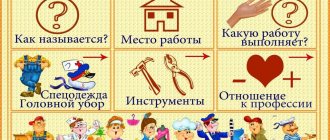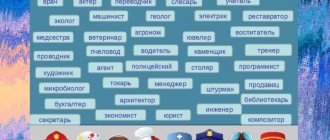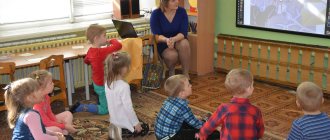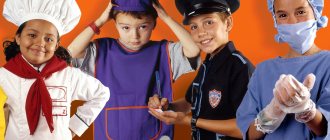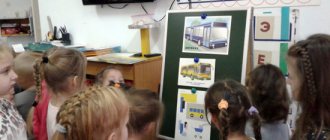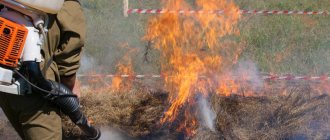General recommendations for conducting speech therapy classes on the topic “Professions” in a preschool educational institution
When conducting a speech therapy session “Professions”, it is important to take into account the characteristics of children’s perception. Children do not yet have self-discipline skills. Therefore, it is important that the activity is playful in nature and captivates them.
Developmental activities for classes
When conducting classes, not only games can be used that expand the children’s knowledge, but also exercises to learn how to correctly pronounce sounds in words and improve speech skills. It is recommended that you plan your children's learning in the coming weeks.
Games on the topic: “Professions”
In this case, riddles and questions are asked, the answers to which expand the children’s knowledge about various specialties. Sometimes false statements are made so that kids will find a mistake.
Stories relating to various specialties are compiled.
List of reading materials for the group
When lexical topics in speech therapy related to professions are considered, for example, reading the following works can be used to work with children:
- J. Rodari “What color are the crafts.”
- Y. Akim “Neumeika”.
- A. Shibarev “Mailbox”.
Note! Reading and discussing works of fiction will help children better understand the topic they are studying. It is useful if such readings are additionally carried out by their parents at home.
Thematic physical education minute
The following describes one example of physical education.
Kids perform movements while the teacher reads the poem “Postman”:
What the postman brought us (Clenches his fists)
He walks around with a thick bag
Translation, magazine, newspaper
There are two cassettes in the parcel (Kids straighten and bend their fingers)
And a letter from Aunt Valya
So that they await her arrival (Hands spread to the sides).
Gymnastic exercises
Typically, physical exercises and finger gymnastics are used during classes. At the same time, the teacher reads a poem related to the topic under consideration. At certain moments, children perform movements that relate to the spoken phrases. If necessary, the teacher tells you what to do.
Using interactive whiteboards and ICT in the learning process
The use of ICT makes it possible to offer children exciting educational computer games.
For example, they may be offered pictures of people and objects that they use in their work. At the same time, children will have to describe in words what is shown in the pictures and write a short story about this profession. The use of computer technology can expand the learning opportunities for preschool children. However, it is necessary to teach children to work with it in subgroup classes.
Age characteristics and correction of speech disorders during group classes
Knowledge of the peculiarities of the lives of adults related to their work is vital for children, but at different ages the approach to studying issues related to professions should be different. He must take into account the age characteristics of the children.
Poster about different professions
Lexical topic “Professions” in the middle group
Classes in the middle group not only develop speech skills, but also provide basic knowledge about what professions are and what they are like.
Purpose and objectives of the lesson: getting acquainted with different professional specialties
The following tasks are performed:
- When working with children, they are given the concept that there are different professions and are told about their main features.
- Vocabulary develops, articulation improves when pronouncing sounds.
- Children develop auditory attention and logical thinking.
It is recommended to plan classes for the near future.
Brief lesson plan
Finger gymnastics is performed with children. It is done as follows:
The use of mnemonics in the development of speech in preschool children
There are many noble professions (In this case, in turn, each finger of the right hand is connected to the thumb).
Both useful and pleasant (Make the same movements with the fingers of your left hand).
Cook, doctor, painter, teacher, salesman, miner, builder (Connect the fingers of the left hand and right hand with the thumbs).
I don’t name everyone at once (at the same time, the kids clench and unclench their fists several times).
I suggest you continue (children stretch their arms forward, keeping their palms facing up).
Next, the teacher conducts a poetic dialogue with the kids: “Was there a shoemaker?/Was!/Sewed boots?/Sewed!/Who are the boots for?/For the neighbor’s cat!” This exercise is designed to improve the clarity of diction and work on the expressiveness of the pronunciation of sentences.
The lesson uses tongue twisters to develop clarity of pronunciation and correct pronunciation of various sounds. At the same time, the teacher and the children try to pronounce certain phrases. Here is an example of a tongue twister: “The leaking faucet really wants the plumber to fix it.”
Important! Throughout the lesson, children are given a variety of vocabulary exercises.
Thematic poems and tongue twisters
The poetic form of presenting material to children helps them better assimilate the material. Therefore, it is important to use poems and read them aloud to the teacher together with the children. One of the exercise options is to ask poetic riddles.
Here are some examples:
- “Doctor, but not for children, but for birds and animals. He has a special gift. This doctor..." (Vet).
- “We teach children to read and write. Love nature, respect the elderly." (Teacher).
- “At work, day after day, he commands with his hand. That hand raises. A hundred pounds under the clouds." (Crane operator at a construction site).
Tongue twisters not only allow you to improve your vocabulary, but also provide an opportunity to improve children’s diction.
The following tongue twisters can be used:
- “Sailors in sailor suits. Sailor suits in stripes."
- “Two woodcutters, two woodcutters are chopping wood with axes in the yard.”
- “The weaver is weaving fabric for Tanya’s dress.”
When working with children in a speech therapy lesson on the topic “Professions,” the following game can be used. It's called "Fable Poems."
Its goals are: improving auditory attention, improving the ability to think logically, and developing children’s vocabulary related to the topic of professions.
The game consists of reading poems about the professions of adults to children, and in them the teacher makes erroneous statements. Kids are required to determine what is true and what is not. At the same time, the speech therapist and children discuss the answers in detail.
Lexical topic “Professions” in the senior group
Important! At this age, children are able to master not only basic concepts about various specialties, but also begin to create general ideas about the world of adults and the place that professional activity occupies in it.
Objectives of the lesson: forming a holistic picture of the world
Children are taught to briefly talk about their professions. During the lesson, they learn more about the types of activities adults do. When assignments are completed for children in the speech therapy group on the topic “Professions,” children are taught that work is necessary and its social significance is explained.
Kids are trained to form masculine and feminine words from the names of workers (military and military, teacher and teacher).
Note! Children develop the ability to recognize speech by ear, improve visual perception and attention. They are helped to develop memory, attention and the ability to speak coherently.
Children are encouraged to be active, take initiative, and have the ability to work collectively.
Lesson outline
When considering lexical topics in the senior group, a thematic physical education session first takes place.
A conversation is held about what a profession means for an adult. They talk about how there are different professions and give relevant examples. They talk about the need to earn money to buy household items that the family needs.
Peculiarities of mastering the sound aspect of speech by preschoolers
The story is told on behalf of the kids who were arguing about whose profession was more important. The teacher and children discuss this dispute and give their answers.
A rhyming game is being played. For example, phrases are uttered about professions related to transport: “The train is driven by ... (driver). Plowing the field... (Tractor driver)..." Children must complete each phrase.
Children take cards out of envelopes and see pictures of a person working. They should talk about his specialty.
Children, with the help of a teacher, compose their stories about various professions, guided by a rough plan and pictures.
A physical education session is held. At the same time, poems about professions are read, during which children imitate the corresponding movements.
The teacher gives phrases, and the children guess who could say them.
Kids are asked to name workers in masculine and feminine genders (for example, pilot).
In conclusion, the results are summed up, the teacher reminds the children what new they have learned.
Game technologies in education
In the process of working with children, lexical exercises are actively used and physical education sessions are held. Children are taught to independently compose simple stories about various specialties. Questions and riddles are actively used, to which children must find the answer.
Lexical topic “Professions” in the preparatory group
At this age, it is important to prepare people for school, to give them knowledge of how adults live.
Purpose and objectives of the lesson
In classes with preschoolers, it is necessary not only to expand the vocabulary related to the topic under consideration, but also to form their horizons, make knowledge more systematic, develop children’s communication skills, and the ability to coherently express their thoughts.
Activities
At this time, physical education and game moments are still important, but the formation of an outlook, the ability to express one’s thoughts and the ability to conduct a focused dialogue with other people are of particular importance.
Preliminary work on studying literary material
The teacher tells the children about descriptions of various workers that are available in children's literature.
The children read aloud thematic literary works.
Equipment
When the lexical topic “Professions” is considered in the preparatory group, pictures are needed as handouts. They should depict representatives of various professions.
Note! The teacher should have prepared demonstration images on the topic of the lesson. A board or screen can be used on which visual material will be shown.
MAGAZINE Preschooler.RF
Abstract of the educational activity “Journey into the world of professions” in the middle group of kindergartenCognition (Socio-communicative development, speech development, artistic and aesthetic development)
Goals: expand and clarify children’s ideas about the work of people of different professions; cultivate respect for working people, their activities and their results; develop attention, memory, thinking.
Software tasks:
Educational objectives: to consolidate children’s knowledge about professions, to show the importance of work in a person’s life; clarify, generalize and expand children’s knowledge about the characteristics of certain professions.
Developmental tasks: to promote the development of coherent speech, thinking, memory, curiosity, observation, to activate and enrich the children’s vocabulary with nouns, adjectives, verbs on the topic “Professions” .
Educational objectives: create conditions for nurturing respectful and kind attitude towards people of different professions; promote the development of the ability to work in a team.
Activation of the dictionary: phonendoscope.
Demonstration and handout material: multimedia equipment (pictures of professions and tools are shown on the projector), a board, magnets, pictures of vegetables and fruits, pots and jars, pictures of a drawn comb without teeth, pencils, steering wheel, “bus ” , first aid kit
Progress of the lesson
1. Organizational moment. Establishing emotional contact. [slide 1]
Invented by someone simply and wisely
When meeting, say hello: - Good morning!
Good morning to the sun and birds.
Good morning to smiling faces.
And everyone becomes kind and trusting
Good morning lasts until evening.
- Guys, let's wish each other good morning. (Children say hello.)
2. Announcing the topic of the lesson. Introductory conversation.
− Guys, every day in the morning your parents bring you to kindergarten, [slide 2] and they themselves go where, do you think? (Children's answers)
That's right, off to work. All people work. Do you know what your parents do? (Children's answers)
I work too. Tell me where and who do I work for? (Children's answers) Yes, I work in a kindergarten, and my profession is a teacher. [slide 3] What do you think a profession is? (Children's answers.)
A profession is work to which a person devotes his life; it is a person’s main occupation, his work activity. There are a lot of professions, all of them are very necessary and important for people. To get a profession, what do you think needs to be done? (Children's answers) That's right, you need to study well, know and be able to do a lot.
Educator: Guys, can’t you hear, it seems like someone is crying. Yes, this is our Kuzya. Kuzya, what happened?
Kuzya: When I grow up, I want to become a real Man, and Nafanya says that a real Man must have a profession, but I don’t know what that is (cries).
Children sit on the mat. They calm down Kuzya.
Educator: Yes, every adult has a profession. A profession is something that is done every day.
Kuzya: how complicated and incomprehensible everything is.
Educator - We will try to help you. Today we are going into the world of professions. And now I want to invite you to go on a journey through the world of professions. And on the trip, I suggest you go on the train, which is already waiting for us near the kindergarten. Take your seats and let’s hit the road. Go! [slide 4]
(Children's answers)
3. Introduction to the profession of “Cook” .
- And here is our first stop [slide 5].
(Children get off the “bus” and approach the screen)
Guys, where do you think we have come? What's the name of this place?
(Children's answers)
That's right, this is the kitchen - the room where food is prepared. What profession do people work here? (Children's answers)
That's right, cooks [slide 6]. This is a very important and necessary profession. There is a cook in kindergartens, schools, hospitals, factories, and cafes.
What does a cook do?
(Children's answers: cooks, fries, bakes, stews, cleans, cuts, etc.)
The cook knows how to prepare many tasty and healthy dishes, and knows how to bake cakes and pies. Guys, what does a chef need to work?
(Children’s answers: stove, pots, pans, ladles, etc.) [slide 7]
Let us help the chefs prepare soup and compote. And you watch, Kuzya, and learn! Tell me, what products can you use to make soup? (Children's answers: potatoes, onions, cabbage, etc.)
How to call all this, in one word? (Children's answers: vegetables)
Well done! This means that you and I will prepare soup from vegetables. And what products are the compote made from?
(Children's answers: apples, pears, etc.)
How to call these products in one word?
(Children's answers: fruits and berries) That's right! We will prepare compote from fruits.
Didactic game “Soup or compote?” On the tables there are pictures of vegetables, fruits and berries, pots and jars. Vegetables need to be put in a pan (soup), fruit and berries in a jar - in a jar (compote). At the same time, it is necessary to encourage children to explain their choice with the words: “An apple is a fruit, so compote is made from it” or “Onions are added to soup .
- Okay, so we cooked you a delicious soup and compote. Now let's go on our way, take your seats on the train. Go! [slide 8]
4. Introduction to the profession of “Hairdresser” .
- And here is the next stop [slide 9]. (Children get off the “train” and approach the screen)
Where do you think we ended up? (Children's answers)
That's right, this is a hairdresser. Tell me, who works here?
(Children's answers)
That's right, hairdresser [slide 10]. What does a hairdresser do at work? (Children's answers: cuts, dyes, does hair, etc.) [slide 11].
What tools does a hairdresser use in his work?
(Children’s answers: comb, scissors, hairdryer, etc.) [slide 12].
This is a very interesting and creative job, because a hairdresser does different hairstyles every day and makes people beautiful. People in this profession must be neat, polite and hardy, because they spend the whole day on their feet.
Guys, the hairdresser asked us for help, he works a lot, and the teeth on his combs are broken, let's help him and finish drawing the teeth on the combs. Shall we help? Then go to the tables, take markers and finish drawing the teeth..
...the teeth are vertical lines of the same length.
(The teacher invites the children to draw combs.)
Drawing “Add teeth to the comb . Children draw “comb teeth” - vertical lines of the same length on a drawn blank.
Educator: - Well done, and they coped with this task, helped the hairdresser fix all the teeth, now he can continue to work.
Kuzya: how much you learn about professions!
5. . Physical education minute. [slide 13].
Game: “Who is doing what?” Here is a list of professions.
Kuzya - I can handle this task myself.
Teacher - are you sure? Let us help you a little. Let's stand in a circle. If you say it correctly, the children will clap, if you say it incorrectly, they will stomp.
The doctor gives an injection.
The artist waters the flowers.
The hairdresser washes clothes.
A fireman extinguishes potatoes.
The driver is painting the walls.
Educator - you mixed everything up, let's play a game with the ball “Who is doing what?” and you will figure everything out.
Kuzya names his profession, and the one to whom he throws the ball answers.
1. Doctor. makes a compress, gives medicine, applies ointment, looks at the throat, applies a bandage, plaster.
3. The seller ...counts the money, weighs the goods, sells, packs.
4. Hairdresser...cuts, dries hair, washes, does hair, dyes hair.
5. A fireman...puts out a fire, saves people, stocks up on water, goes to the rescue.
6. The cook...fries cutlets, cooks compote, makes vinaigrette, bakes pies.
7. The driver...drives cars, changes tires, transports people, makes repairs.
8. The postman ... brings letters, newspapers, magazines, puts them in the mailbox, carries telegrams, walks with a large bag.
Well done, you completed this task, Kuzya, did you remember everything?
- Let's move on. Go! [slide 14].
6. Introduction to the profession of “Doctor” .
- And here is the next stop [slide 15]. (Children get off the “train” and approach the screen.)
Where do you think we ended up?
(Children's answers)
That's right, this is a clinic (hospital). Tell me, what profession do people work here? (Children's answers)
That's right, doctors [slide 16].
What does a doctor do? (Children's answers: treats, gives injections, writes prescriptions, measures, listens, etc.)
What does a doctor need to work? (Children's answers: first aid kit, thermometer, bandages, syringe, etc.) [slide 17].
Do you know what this tool is called and what it serves?
(Children's answers)
This instrument is needed to listen to your internal organs: heart, lungs. It's called a phonendoscope. [slide 18].
(Children repeat the new word.)
The profession of a doctor is a very important and necessary profession.
Tell me, what would happen if we didn't have doctors? (Children's answers)
That's right, if there were no doctors, people would often get sick and could die from various diseases. Doctors are different. What doctors do you know?
(Children's answers)
That's right, a pediatrician treats children, a surgeon performs operations, a dentist treats teeth, an ophthalmologist checks vision. Doctors must be brave, determined and strong. Now I suggest you play a game.
Didactic game . ” Kuzya helps! There are various objects on the table, from which children need to choose the tools the doctor needs for his work.
Educator: Do you understand, Kuzya?
Kuzya: Yes, I learned a lot today! And most importantly, I realized that I need to study a lot.
Result:
− Our journey to the land of professions is coming to an end. What professions did we meet today? (Children's answers)
We will definitely continue our trip next time, because there are a lot of professions. And all of them are very important and needed by people. Now let's take a course back to kindergarten.
(Children get on the “train” [slide 19] and return to kindergarten [slide 20])
Kuzya - Yes... there are so many professions in the world. I learned so much today. Guys, we completed all the tasks, for this I thank you, and I give you these coloring books!
Say goodbye to Kuzya!
Educator: Guys, thank you for your efforts, you all did well today!
| Next > |
